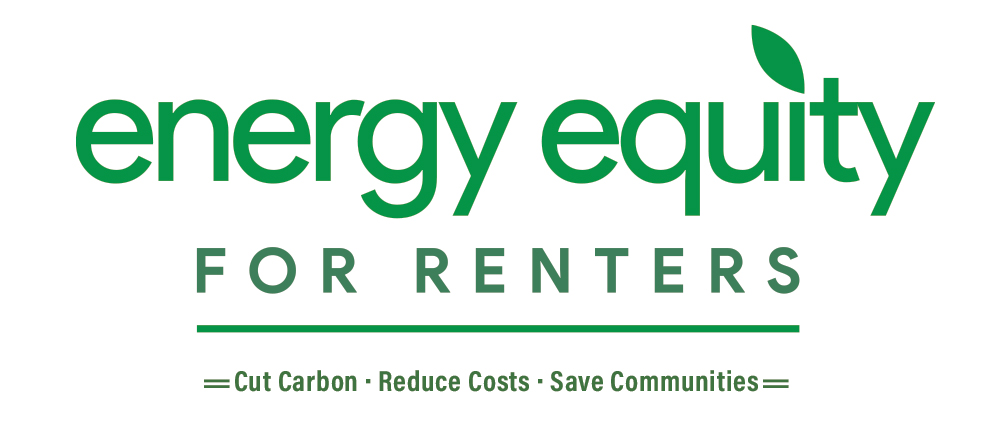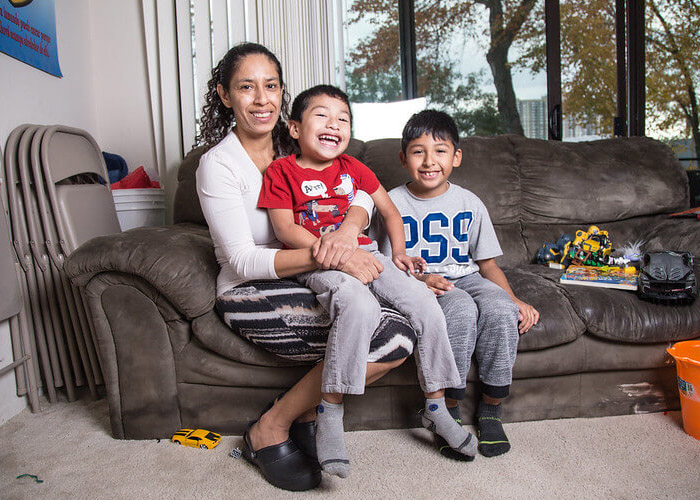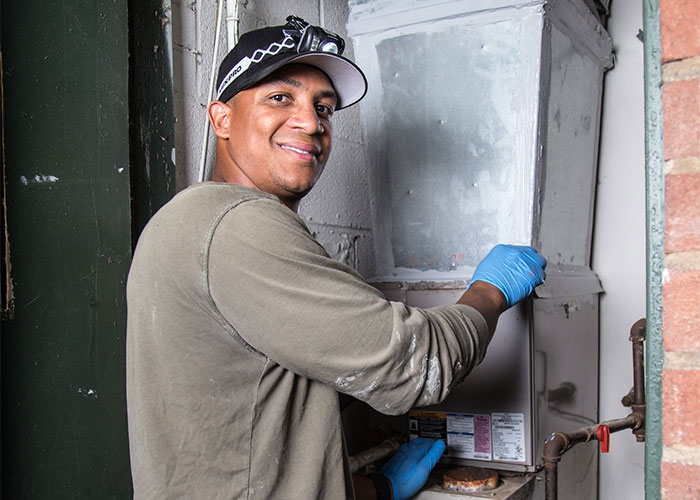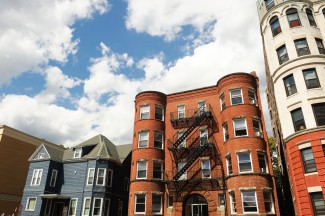
ACEEE’s initiative for affordable, energy-efficient housing for renters
Research Spotlight:
Guide for local governments. Our guide presents a series of actions that local governments can take to reduce energy use in rental properties, preserve or increase housing affordability, and build capacity to design, implement, and evaluate equitable policies.Toolkit for local governments. Our rental housing energy efficiency toolkit provides research and case studies on integrated energy efficiency and anti-displacement strategies, roles for local government in filling financing and funding gaps, stakeholder and community engagement, and comprehensive equity accountability measures.
Fact sheet. This resource provides a high-level summary of the different sections of the toolkit. In addition to English, it is available in Arabic, Somali, Spanish, Swahili, and Vietnamese.
Policy tracker. See which cities, counties, and states have adopted equitable energy efficiency policies and programs for rental housing.
These inefficient homes also mean renters spend a lot on energy bills, with nearly one-third having high energy burdens, spending more than 6% of their income on energy bills. Yet for the more than one in three U.S. households that rent their homes, making energy-saving improvements may be difficult or even prohibited.
ACEEE’s Energy Equity for Renters initiative will help tackle the challenge of reducing energy waste in rental housing. Our goal: protect the climate, reduce energy costs, and preserve affordable neighborhoods.
ACEEE is excited to announce a third round of no-cost technical assistance to at least five local governments and their community-based partners. Our technical assistance will support cities and community-based organizations seeking to create, improve, or implement programs that support rental efficiency upgrades while also preserving and/or expanding housing affordability. A recording of an information webinar on the technical assistance is available for those interested in learning more about how local governments and community-based organizations can benefit from this opportunity.
Local government and community-based organizations must submit their application for technical assistance no later than Thursday, January 15, 2026.
ACEEE Helped 10 Jurisdictions Lower Utility Bills and Preserve Affordable Housing
In 2024 and early 2025, Energy Equity for Renters provided no-cost technical assistance to 10 local governments and community-based organizations to address home weatherization, renter energy burdens, residential building electrification, and other rental housing needs. ACEEE worked with these jurisdictions to create and implement programs for rental efficiency upgrades:
- Alachua County, Florida: As temperatures continue to rise, the heat impacts of climate change are intersecting with the affordable housing crisis in a way that is threatening the health and safety of the county's most marginalized residents: low-income renters. To address this issue, Alachua County provides up to $15,000 in energy efficiency improvements to tenants making 50% or less of area median income while committing landlords to maintaining housing affordability. While this initiative has the potential to make renters cooler, safer, and more comfortable at a reduced cost, its adoption isn't as widespread as it could be. ACEEE’s technical assistance helped Alachua County and its community partners, Rebuilding Together North Central Florida and the Community Weatherization Coalition, in troubleshooting the current energy efficiency program to reach more residents quickly.
- Burlington, Vermont: The City of Burlington has a rental weatherization ordinance requiring multi-unit dwellings over a certain energy use threshold to weatherize their buildings to reduce thermal energy use, reducing carbon emissions and keeping tenants warm in winter and cool in summer. As the city works to implement the ordinance, ACEEE’s technical assistance enabled the city to i\ partner with community-based organizations to determine how to best share and communicate about the law with tenants, property owners, and others.
- Cincinnati, Ohio: ACEEE supported the City of Cincinnati in launching a new iteration of its WarmUp Cincy program in 2025. The updated program encourages rental property owners to make energy upgrades that lower utility costs, improve comfort, and cut greenhouse gas emissions. ACEEE provided guidance to help the city implement the program in ways that ensure that benefits reach renters and that energy improvements preserve housing affordability.
- Denver, Colorado: Working with ACEEE, the Climate Action, Sustainability, and Resilience Agency (CASR) of the City and County of Denver sought to leverage its work with community-based organizations in public outreach and engagement. The agency aims to address Denver’s foremost climate vulnerabilities: extreme heat and water scarcity. It is prioritizing building a resilient community for all while moving toward a carbon pollution-free environment.
- King County, Washington: King County has prioritized reducing utility burdens and expanding renewable energy and energy efficiency deployment in frontline communities as part of its Strategic Climate Action Plan. ACEEE’s technical assistance supported a county-led project that analyzed the utility burden on renters in frontline communities to help develop policy recommendations for improving utility bill affordability while meeting the county’s climate goals.
- New Bedford, Massachusetts: The City of New Bedford has been working with landlords and CBOs advocating for energy-burdened renters to identify opportunities to incentivize energy efficiency upgrades in multifamily rental properties. ACEEE supported this effort by facilitating discussion and identifying lessons learned and best policy practices in other communities across the country.
- Philadelphia, Pennsylvania: The Office of Sustainability in the City of Philadelphia is interested in understanding how to address energy burdens for tenants in small rental dwellings. The Office worked with ACEEE and local community-based organizations to understand how low-cost energy disclosure mechanisms can be used to address this challenge.
- San José, California: The City of San José i launched an incentive program and a zero-interest loan program to support residential building electrification. The city and its partner community-based organizations are eager to serve these programs to the 45% of San José residents who are renters. ACEEE’s technical support enabled the team to solicit feedback from the community to understand barriers to energy upgrades and recommend program design and complimentary policies to support renters.
- Skokie, Illinois: The Village of Skokie and local community groups wish to optimize building energy efficiency in multi-family buildings. They have worked to engage with residential property owners, developers, and renters to assess the community's housing needs and determine how housing providers for low- and moderate-income households can implement energy efficiency and decarbonization measures equitably. ACEEE technical assistance supported the Village of Skokie and its community partners by reviewing case studies and best practices to design incentive programs for building owners and developers.
- St. Petersburg, Florida: The City of St. Petersburg and its community partners aimed to identify and incorporate potential energy efficiency opportunities in current rehabilitation programs for rental housing. ACEEE collaborated with the City of St. Petersburg to evaluate existing city programs to align rental housing and energy efficiency programs, including: the Rebates for Residential Rehabilitation (RRR) program, the utility assistance program, Integrated Sustainability Action Plan (ISAP), the city’s energy roadmap, and municipal code requirements.
Energy Equity for Renters announced its third round of technical assistance services to local governments and their CBO partners. In this new round of technical assistance, ACEEE will work with at least 5 local governments and CBOs to grow their knowledge, resources, and planning and evaluation procedures.
Energy Equity for Renters provided its first round of technical assistance to five jurisdictions and CBOs in: the San Francisco Bay Area; Cambridge, Massachusetts; Duluth, Minnesota; Portland, Oregon; and Tacoma, Washington.
ACEEE’s Energy Equity for Renters initiative is generously supported by the Kresge Foundation and The JPB Foundation.
Our Recent Work

-
Multifamily energy savings project. Our work to support comprehensive building upgrade programs serving renters living in market-rate and affordable multifamily housing.
-
Energy burden research. In addition to renters, we found that low-income, Black, Hispanic, and Native American households all face dramatically higher energy burdens—spending a greater portion of their income on energy bills—than the average household.
-
Low-income energy efficiency programs. ACEEE’s resources on best practices to expand energy efficiency investments for households with low incomes.

-
Local high-impact strategies toolkit. Toolkit includes guides on residential energy disclosure mechanisms as well as commercial and multifamily energy benchmarking, transparency, and labeling.
-
Mandatory building performance standards. A growing group of cities and some states are mandating retrofits of inefficient buildings by requiring them to meet standards that cap their energy use or carbon emissions.
Rental property energy labeling. This report summarizes the findings from a rental energy labeling experiment, explains the key design features of effective energy labels, and provides recommendations to local policymakers for designing and implementing energy disclosure policies for rental properties.
Technical assistance for communities seeking to improve energy efficiency in rental housing. The no-cost assistance helps local governments and community-based organizations with energy efficiency programs that also preserve or expand housing affordability.
